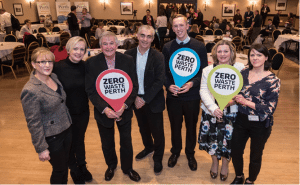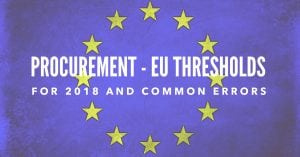European Structural and Investment Funds
European Structural Funds Spring Newsletter
March 1, 2018 by No Comments | Category Newsletters

Welcome to the European Structural Funds newsletter. In this edition you can read our regular topics including important dates to note, updates on Smart, Sustainable and Inclusive Growth as well as:
- Website and guidance updates
- An introduction to Noah the project lover
- EU procurement thresholds
- EU exit
We’d welcome lead partner contributions to the newsletter. Contact us at europeanstructuralfunds@gov.scot to share news or updates. Use this same address if you wish to be added to our mailing list, or to send us feedback on any of our articles. You can also subscribe to RSS feeds to receive updates as and when we publish on the blog.
If you have any upcoming events, launches, or any activity to publicise, let us know and we can post on twitter or re-tweet.

2018 Key Dates
2018 is a big year for Structural Funds! On 1 February we launched a call for applications for the second phase of the programmes with the aim to fully commit what is remaining of the funds by the end of the year.
See our blog for more information on the appraisal timeline, and the documents you need and where to find them.
Managing Authority Approval Panels.
In order to ease submission, appraisal and processing of applications MA Approval Panels have been scheduled on a six-weekly basis – rather than the previous quarterly basis. The panel met on 21 February and the next meeting will take place on 4 April to discuss any new operation submissions, extension requests, and review any change requests requiring MAAP approval.
13 April 2018
Economy, Jobs and Fair Work Committee launched ESIF consultation – 13 April deadline:
http://www.parliament.scot/parliamentarybusiness/CurrentCommittees/107784.aspx
9 May 2018 – Europe Day
Get your flags ready for Europe Day.This year we celebrate in George Square, Glasgow where we will have a stall.
Committee Meetings
The next Highlands and Islands Territorial Committee will be on 3 May and the Joint Programme Monitoring Committee meet on 30 May.
Lead Partner Event
The evaluation for our lead partner event in August can be found on our new events evaluations webpage:
https://beta.gov.scot/publications/esif-events-evaluations-2014-2020/
Your feedback is invaluable to help us prepare for future events.
There will be an event end June and we’ll issue details as soon as the date and venue have been confirmed.
Annual Event
We are now considering options for the 2018 annual event and would like to hear your views on the 2017 annual event.
A Storify of the 2017 annual event which took place in November has been created and can be viewed until May here: https://storify.com/ESFScotland/european-structural-funds-annual-event-2017
We will shortly be releasing a summary of the event and will issue a link for feedback and appreciate your contributions.

ESIF website and guidance updates
The Strategic Intervention and Operation application forms have been updated and can be viewed here:
- Strategic applications: https://beta.gov.scot/publications/esif-strategic-intervention-application/
- Operation applications: https://beta.gov.scot/publications/esif-operation-application/ The outputs and results annex has also been updated and published on both pages.
1 March 2018: National Rules update to be published
This update will include:
- Introduction of Part Time Staff Costs and template timesheet
- Evidence of 1 day non-financial support to enterprises
- Update to Procurement with match
- Sick Pay clarification
- Apprenticeship Levy
Phase 2 Extensions
Two new documents have been added to the ‘Help’ section in EUMIS which you will need if submitting extension requests. The documents also include a summary of the Horizontal themes.
‘Extension – Operation Phase 2 Extension Change Request – Supplementary Document’
‘Extension – SI Phase 2 Extension Change Request – Supplementary Document’
The LP Change Request Guidance has also been updated to cover phase 2 extensions.
Other website updates include:
- A new events evaluations page: https://beta.gov.scot/publications/esif-events-evaluations-2014-2020/
- ESIF publicity toolkit published, presented at the August lead partner events: https://beta.gov.scot/publications/esif-events-evaluations-2014-2020/
- The June 2017 JPMC committee minutes and papers published: https://beta.gov.scot/publications/jpmc-minutes-june-2017/
- ESF and ERDF operational programmes 2014-2020 documents updated: https://beta.gov.scot/publications/esif-operational-programmes-2014-2020/
- ESIF complaints process published: https://beta.gov.scot/publications/european-structural-and-investment-funds-complaints-process/
- The European Commission – public procurement guidance for practitioners link on our forms and guidance page has been updated with new guidance on Public Procurement procedures
We welcome your feedback on the ESIF webpages on what you would like to see. Please provide any feedback to europeanstructuralfunds@gov.scot

Noah the project lover!
Everyone! If you haven’t already done so, meet Noah!

Noah loves projects and is on his travels to see some of the wonderful projects supported by EU funding. Noah joined us in December 2017 and will be in the UK for at least 6 months.
So far he has visited projects in France, Slovenia, Malta and Ireland. Now it’s our turn to show him projects which are benefiting from EU funds in the 2014-2020 programmes in Scotland.
You can check and follow Noah on his travels on his YouTube channel:
https://www.youtube.com/user/MrNoah2014
Noah was excited to meet who he was going to be working with from the Scottish Managing Authority and fitted in well with colleagues.

He got to know colleagues and learned more about the directorate at the divisional away day in January. He set out on his first project visit of the year at the launch of the Falkirk Active Travel Hub.

Noah says: “I was really excited to visit the Active Travel Hub. Minus the weather as it was super cold with much of Falkirk covered in snow! But that didn’t stop me! I met lots of people at the hub who were very helpful by providing expert knowledge! They showed me focal points for cycling and walking routes and told me about behavioural change initiatives to support and encourage people to choose active travel, particularly for shorter journeys. There is a lot of support available to the local community to help them make healthier and greener travel choices including sustainable modes of transport such as electric bikes or electric cars. I even got a shot of one of the bikes! And some yummy cake! Thank you to everyone who were all so friendly. What a worthwhile project!”
Noah also visited Business Gateway in Falkirk where he got a tour of the football stadium. Next, Noah will be making his way up to the Scottish Highlands to visit some more interesting projects. He is also hoping to see Nessie, the Loch Ness monster.
Follow Noah on his travels in Scotland on the ESIF Twitter page @scotgovESIF.
A video of his experiences and the projects he has visited in Scotland will be published on his YouTube channel before he leaves the UK.

Horizontal Themes
The three themes which should be reflected in all ESF and ERDF strategic interventions and operations are: sustainable development; equal opportunities and non-discrimination; and equality between men and women.
Annex A of the Extension Supplementary Questionnaires (held in the help section on EUMIS) provides an overview of the three themes, the regulatory framework underpinning them and their role in the application and monitoring process.
This will be developed and produced as a separate piece of guidance in due course. In the meantime please refer to the Annex and let us know if you have any questions.

Growth Teams Update – General
Claims
Staff are working through claims to get them processed, verified and paid as quickly as possible. First claims are taking longer to process and pay as Lead Partners adapt to the requirements of the new Management and Control System and the increased level of checking. We would also remind Lead Partners that they should be conducting a full check of all costs prior to submission of a claim to ensure that costs are eligible and a full audit trail can be provided. This will help to speed up the verification and payment of claims.
Lead Partners are encouraged to ensure that further catch-up claims are submitted as soon as possible after previous claims have been processed to ensure that we are in a good position to meet the N+3 target for 2018.
The Smart File Transfer Protocol (SFTP) appears to be working well. However, there have been some problems for Managing Authority staff when transferring the data onto our SG systems. Therefore we would ask Lead Partners to ensure that they limit the number of sub-folders when submitting claims evidence as this results in file names being too long.
Extensions to Phase 1 and Phase 2 and Lead Partner Discussions
Following the call for Phase 2 applications posted on the web-site MA staff have been contacting all Lead Partners to arrange early discussions. Some of these discussions have already taken place and we would urge all Lead Partners who have not yet responded to get in touch to ensure that change requests and new applications can be submitted as early as possible to maximise commitment of the funds.
Article 125 (5) (b) Second Stage On-the-spot Verification
Stage 2 on-the-spot checks will commence this year. Two pilots visits were carried out in January and the documents are being updated following feedback from the lead partners and Managing Authority staff involved. Guidance is being produced to aid preparation for these visits and will be released shortly.
Interruption to the Programmes
The Commission has notified the Managing Authority that is has placed the Scottish Programmes into ‘Interruption’. This means it will not make further payments to SG until issues identified by the Audit Authority are resolved. Three audits carried out on ESF processes identified issues and made a number of recommendations. In each, the audit trail was not complete enough to satisfy the EC. Only when the EC are assured that processes are working satisfactorily can the interruption be lifted. We are currently working with audit colleagues to address the EC concerns and undergoing a rigorous check of all work carried out to date. This does not impact on claims and payments made by the Scottish Government to lead partners.

Smart Growth Update
YEI and Wage Subsidy
Just a reminder that the physical end date for the Youth Employment Initiative (YEI) is 30 September 2018. With this in mind the last recruitment date for wage subsidy should be no later than the 30 March 2018. The six month wage subsidy will then take operations to the physical end date of 30 September 2018.
If any Lead Partner wishes to operate a wage subsidy less than 6 months please contact your Portfolio Manager.

Inclusive Growth Update
Verifications
A common issue relating to the verification of participant milestone achievements has centred around the incorrect interpretation of definitions relating to a participant’s employment status or barriers to employment e.g.
‘Registered Unemployed’ versus ‘Economically Inactive’
On a number of registration forms, the individuals has been recorded as ‘Registered Unemployed’ – however, on closer inspection of the form it has become apparent that these individuals should have an employment status of ‘Economically Inactive’ as they are not in receipt of JSA or ESA (Work Related Activity Group).
‘Underemployed’
On a number of registration forms, the barrier of ‘Underemployed’ has been selected – however these individuals are also recorded as ‘Registered Unemployed’. The definition of ‘Underemployed’ within the Participant Guidance clearly states that this barrier relates to ‘Employed’ participants only as it relates to ‘an employment situation that is insufficient in some important way for the worker’.
Lead Partners are encouraged to ensure that sufficient time is taken during the registration process to ensure that participants are recording accurate information on their registration forms that is in line with the definitions contained in the Participant Guidance.
Participant Guidance
An updated version of the Participant Guidance is due to be published in March 2018 – a session / discussion relating to these updates will form part of the agenda at the next Lead Partner Event.

Sustainable Growth Update
The past few months have seen more Challenge Fund rounds for Transport Scotland and Scottish Natural Heritage. The Transport Scotland, Low Carbon and Active Travel Transport Hubs Challenge Fund, launched Round 2 at the end of 2017, applications are now being assessed and we look forward to seeing the range of projects that will be approved under this round.

Scottish Natural Heritage have launched the second Round of the Green Infrastructure Community Engagement Challenge Fund (www.greeninfrastructurescotland.scot/news/green-infrastructure-community-engagement-fund-round-2-open-applications) and the application deadline is 3 April 2018. As work continues on existing project sites, the main Green Infrastructure Challenge Fund is expected to open for Round 3 later this year.


Zero Waste Scotland have continued to support a wide range of work through the Resource Efficient Circular Economy Strategic Intervention. Several areas of their work have been in the media lately, including the recent announcement about Scotland’s Zero Waste Towns.
Perth, Leith and central Edinburgh have been selected as the locations for Scotland’s Zero Waste Town projects, each receiving a share of nearly £900,000 in funding, which includes support from ERDF, to ‘make things last’ where they are based.
The aspiration is that one day all towns, cities and villages in Scotland will adopt zero waste principles, so the Zero Waste Town pilot projects are bolding going first to learn lessons that the rest of us can follow. The new projects in Perth, Leith and Edinburgh will provide lots of fantastic new approaches to community engagement around zero waste and the circular economy.
The Zero Waste Perth will see Beautiful Perth, in partnership with Perth and Kinross Council and Perth College, delivering a range of projects in the north part of Perth City Centre including local food sharing activity, food waste prevention with local food businesses, food waste education in schools, food waste cookery demos, a local collaborative network for re-use organisations, repair workshops, recycling promotion to householders and businesses, resource efficiency support for local businesses and piloting of local circular economy projects in partnership with local businesses.

The Zero Waste Leith will see Changeworks delivering a range of projects in Leith including street based approaches to litter, recycling and re-use initiatives, schools engagement, food waste reduction engagement, repair workshops, a ‘re-use house’ installation in partnership with a local housing association, a zero waste business charter and working with businesses to become project ambassadors and promote zero waste initiatives to their customers and suppliers.

The Zero Waste Edinburgh project launches on 7th March 2018, SHRUB are delivering a range of projects in the south central area of Edinburgh including an ambitious food sharing hub including a food waste café and redistribution network, a wide-ranging programme of workshops for food waste reduction, re-use, upcycling and repair for the local community, a programme of re-use activity collecting goods from students at the end of each term to be given away to incoming students next academic year and the creation of local Zero Waste Advocacy Network to share knowledge and foster a project legacy.

PROCUREMENT – EU Thresholds for 2018 and Common Errors
As you will know, sometimes to your discomfort, procurement features in a large number of operations – at application stage, identifying procurement as (part of) the delivery arrangements, at claim stage as payments to contractors are checked and throughout implementation as contract management plays an important part in ensuring that the necessary outputs are achieved.
At the risk of stating the obvious, procurement can be tricky and close liaison with your procurement colleagues is essential to getting off – and crucially, staying – on the right foot. To assist with that you may find the tables below useful as an indication of the various EU thresholds and minimum timescales for undertaking procurement exercises.
EU thresholds and minimum timescales for procurement exercises
COMMON ERRORS / OVERSIGHTS
You may also find it helpful and we would greatly appreciate if you could bear the following in mind when responding to questions on your respective procurements and help avoid common errors and unnecessary delays.
In general terms, Lead Partners often fail to provide all that we ask for, are often slow to respond (this is holding up claim processing and payments) and don’t always check the internal consistency of what is sent.
More specifically;
Lack of detail
- The Lead Partner contact can lack detailed procurement knowledge and has to liaise with their procurement colleagues to provide the requested information and documentation. This slows down the process particularly where procurement people are not aware of why information is required.
- It is vital that the details being entered on the procurement section in EUMIS are correctly done so our sampling of contracts is accurate and level of assurance in relation to your operation(s) is reliable.
- Poor numbering and naming of documents. There can be a lot of complex documents to check and a lot of time can be lost trying to work out which document is which. Please ensure that the evidence being provided makes sense and flows to show a transparent audit trail.
- The document checklist is completed with minimum detail even though we ask for as much as possible. Narrative of the process is often missing. This causes a lot of time going back to LPs and requesting explanations.
Missing documents
- Lead Partners do not always provide the published OJEU notices. Or, on occasion, do not actually publish correctly.
- No Tender Evaluation Report. This is a requirement of the regulations.
Audit trail
- Evaluation of tenders stage causing problems e.g. inadequate trail of evidence to show evaluation process ie ‘the process to agree final scores’ – the final spread-sheet is not enough in itself; the individual score sheets/narrative of the evaluation process are also required.
- Evaluation stage – Technical checks etc – usually always have to ask for these (pass/fail questions before the scoring stage)
- Very little or no detail given on checklist ie narrative
- Expenditure to date for contracts not being completed on EUMIS.
- Amending contracts without proper justification and ‘audit trail’. This includes extending contracts and increases in contract award / value.
This Commission has published an updated version of the “Guidance for practitioners on the avoidance of the most common errors in public procurement of projects funded by the European Structural and Investment Funds” which contains practical suggestions, series of good practices, real-life examples, explanations on specific topics, case studies and templates and useful links in order to help those who are involved in the day-to-day management of EU-supported projects.
http://ec.europa.eu/regional_policy/en/policy/how/improving-investment/public-procurement/guide/
FRAUD IN PUBLIC PROCUREMENT
Also attached below is the European Commission document ‘Fraud in Public Procurement – a collection of red flags and best practices’. This is informative in two particular respects. It sets out the types of error detected in procurement exercises and demonstrates to us as Managing Authority, and you, as Lead Partner, the forensic level of detail to which the Commission goes in their audit of operations and underlying procurement.
 EU exit
EU exit
The UK and EU published a joint report on phase 1 on the negotiations on 8 December 2017, outlining an agreed proposed methodology for calculating the financial settlement. It confirms that the UK will continue to contribute and participate in the implementation of the EU annual budgets up to 2020 as if it was still in the EU. Should formal agreement be reached on this as part of the overall Withdrawal Agreement, we anticipate that Scotland will continue to benefit from the 14-20 programmes and funding covered by the Multi-annual Financial Framework as it would if the UK continued to be a Member State.
We continue to seek clarification on the detail of this from the UK Government. In the meantime, the Scottish Government’s commitment to pass on the current UK Government guarantees in full to Scottish stakeholders (announced by Mr Mackay on 2 November 2016) remains in place.
There is no clarity on what the replacement funding arrangements will be for these schemes once the UK has left the EU or how the UK Government’s proposed ‘Shared Prosperity Fund’ would operate in practice. The details of successor arrangements to replace current EU funding programmes have yet to be proposed by the UK Government. We’ve been led to understand that consultations will begin in the autumn and will look to prepare for this over the coming months.
Call for views – European Structural and Investment Funds inquiry
The Economy, Jobs and Fair Work Committee has launched an ESIF consultation. The deadline for submissions is the 13 April deadline
The Committee issued a general call for views on Thursday 15 February. Over the course of May and June this year, the Economy, Jobs and Fair Work Committee will hold an inquiry into ESIFs and what could replace these once the UK leaves the European Union. The Committee therefore wants to hear the views and experiences of as many people, businesses and organisations as possible. See the link below for details:
http://www.parliament.scot/parliamentarybusiness/CurrentCommittees/107784.aspx

Leave a comment